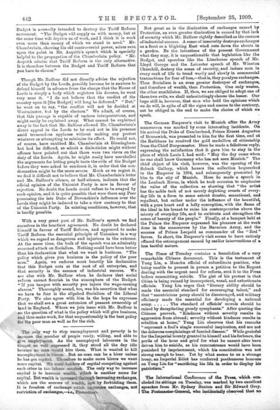Though Mr. Balfour did not directly advise the rejection of
the Budget by the Lords, possibly because he is anxious to defend himself in advance from the charge that the House of Lords is simply a body which registers his decrees, he went very near it. " I do not believe that the verdict of the country upon it [the Bridget] will long be deferred." "But," he went on to say, "the conflict will not be decided at Westminster, but by the electors." We admit, of course, that this passage is capable of various interpretations, and might easily be explained away. What cannot be explained away is the fact that Mr. Balfour allowed Mr. Chamberlain's direct appeal to the Lords to be read out in his presence amid tremendous applause without making any protest whatever or attempting to minimise its effect. He could not, of course, have snubbed Mr. Chamberlain at Birmingham. but had he differed, so adroit a dialectician might without offence have pointed out that there were two views on the duty of the Lords. Again, he might easily have marshalled the arguments for letting people taste the evils of the Budget before they were asked to condemn it, in order that the con- demnation might be the more severe. Much as we regret it, we find it difficult not to believe that Mr. Chamberlain's letter and Mr. Balfour's silence, or half-silence, indicate that the official opinion of the Unionist Party is now in favour of rejection. No doubt the Lords could refuse to he swayed by such opinion, and it is quite possible that were there any Peer possessing the late Duke of Devonshire's influence over the Lords they might be induced to take a view contrary to that of the Unionist Party. In existing conditions, however, that is hardly possible.










































 Previous page
Previous page